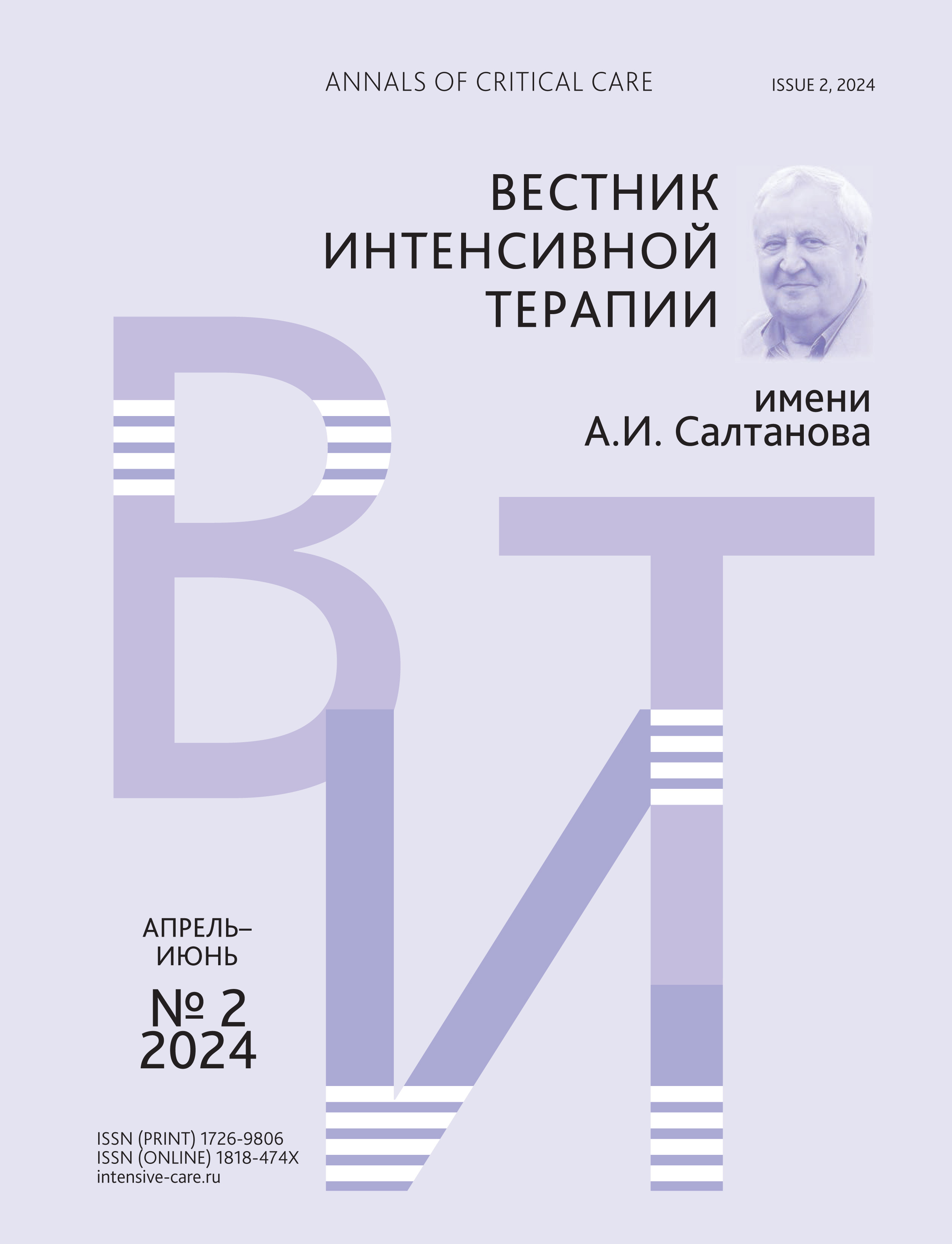Full-text of the article is available for this locale: Русский.
Abstract
INTRODUCTION: Acute mesenteric ischemia (AMI) is one of the most dangerous complications of cardiac surgery using cardiopulmonary bypass (CPB). Several factors may contribute to the development of AMI, such as: age over 70 years, prolonged CBP, postoperative heart failure, cardiogenic shock, mechanical circulatory support and others. The mortality rate in AMI reaches 85 %. OBJECTIVE: To identify predictors of a negative clinical outcome in the development of acute mesenteric ischemia in patients after on-pump cardiac surgery. MATERIALS AND METHODS: A single-center retrospective observational cohort study included 53 patients in the intensive care unit who developed AMI after cardiac surgery performed using CPB. All patients with AMI included in the study were divided into two groups — survivors (n = 31) and non- survivors (n = 22) to identify predictors of negative clinical outcome. RESULTS: At the preoperative stage, the left ventricular ejection fraction (LVEF) was impaired in both groups, but in non-survived patients was significantly lower: 34.6 (25.4–52.4) in survivors and 28.7 (25.2–42.7) in non-survivors (p = 0.05). 12 hours after the surgery, the cardiac index (CI) (p = 0.01) and the index of left ventricular work (ILVW) were significantly (p = 0.03) lower in non-survivors. The average duration of CPB was 124 minutes (95–142) in survivors and 164 minutes in non-survivors (145–176) (p = 0.02). Also, 72.7 % of n0n-survivers received high doses of adrenomimetics in the postoperative period, in survivors — 41.9 % (p = 0.03). The rate of long-term mechanical respiratory support usage in non-survivors reached 86.3 %, in survivors — 35.4 % (p = 0.003). CONCLUSIONS: The key predictors of a negative outcome of OMI in cardiac surgery patients are: prolonged use of CBP, low CI, LVWI before and after surgery, high doses of adrenomimetics, prolonged mechanical respiratory support, as well as high concentrations of blood lactate 12 hours after the end of the surgery.
References
- Cooke M., Sande M.A. Diagnosis and outcome of bowel infarction on an acute medical service. Am J Med. 1983; 75(6): 984–92. DOI: 10.1016/0002-9343(83)90879-3
- Acosta S., Alhadad A., Svensson P., et al. Epidemiology, risk and prognostic factors in mesenteric venous thrombosis. Br J Surg. 2008; 95(10): 1245–51. DOI: 10.1002/bjs.6319
- Tripodi A., Mannucci P.M. The coagulopathy of chronic liver disease. N Engl J Med. 2011; 365(2): 147–56. DOI: 10.1056/NEJMra1011170
- Acosta S. Mesenteric ischemia. Curr Opin Crit Care. 2015; 21(2): 171–8. DOI: 10.1097/MCC.0000000000000189
- Harnik I.G., Brandt L.J. Mesenteric venous thrombosis. Vasc Med. 2010; 15(5): 407–18. DOI: 10.1177/1358863X10379673
- Klotz S., Vestring T., Rötker J., et al. Diagnosis and treatment of nonocclusive mesenteric ischemiaafter open heart surgery. The Annals of Thoracic Surgery. 2021; 72(5): 1583–6.
- Leone M., Bechis C., Baumstarck K., et al. Erratum to: Outcome of acute mesenteric ischemia in the intensive care unit: a retrospective, multicenter study of 780 cases. Intensive Care Med. 2015; 41(5): 966–8. DOI: 10.1007/s00134-015-3738-9
- Brunaud L., Antunes L., Collinet-Adler S., et al. Acute mesenteric venous thrombosis: case for nonoperative management. J Vasc Surg. 2001; 34(4): 673–9. DOI: 10.1067/mva.2001.117331
- Баутин А.Е., Ксендикова А.В., Белолипецкий С.С. и др. О возможности использования фармакологических индексов для прогнозирования течения послеоперационного периода кардиохирургических вмешательств. Вестник интенсивной терапии им. А.И. Салтанова. 2019; 2: 66–74. DOI: 10.21320/1818-474X-2019-2-66-74 [Bautin A.E., Ksendikova A.V., Belolipetskiy S.S., et al. About efficiency of the pharmacological scores as a predictors of outcomes after cardiac surgery. Annals of Critical Care. 2019; 2: 66–74. DOI: 10.21320/1818-474X-2019-2-66-74 (In Russ)]
- Бархатов И.В., Бархатова Н.А. Хроническая мезентериальная недостаточность в экстренной хирургической практике. Практическая медицина. 2018; 2(113): 27–33. [Barkhatov I.V., Barkhatova N.A. Chronic mesenteric insufficiency in emergency surgical practice. Practic Medicine. 2018; 2(113): 27–33. (In Russ)]
- Corcos O., Castier Y., Sibert A., et al. Effects of a multimodal management strategy for acute mesenteric ischemia on survival and intestinal failure. Clinical Gastroenterology and Hepatology. 2019; 11(2): 158–65.
- Ярощук С.А., Баранов А.И., Каташева Л.Ю., Лешишин Я.М. Острая мезентериальная ишемия: подходы к диагностике и оперативному лечению. Научно-практический медицинский журнал. 2018; 2: 54–9. [Yaroshchuk S.A., Baranov A.I., Katasheva L.Y., Leshishin Ya.M. Acute mesenteric ischemia approaches to diagnosis and surgical treatment. Reviewed scientific and practical medical journal, 2018; 2: 54–9. (In Russ)]
- Панкратов А.А., Переходов С.Н., Зеленин Д.А. и др. Острая мезентериальная ишемия — инкурабельная ситуация? Современное состояние проблемы. Хирургия. Журнал имени Н.И. Пирогова. 2020; 12: 105–10. DOI: 10.17116/hirurgia2020121105 [Pankratov A.A., Perehodov S.N., Zelenin D.A., et al. Is acute mesenteric ischemia incurable situation? The current state of the problem. Pirogov Russian Journal of Surgery. Khirurgiya. Zurnal im. N.I. Pirogova. 2020; 12: 105–10. DOI: 10.17116/hirurgia2020121105 (In Russ)]
- Luther B., Mamopoulos A., Lehmann C., et al. The Ongoing Challenge of Acute Mesenteric Ischemia. Vasc Med. 2018; 34(3): 217–23. DOI: 10.1159/000490318
- Authors/Task Force Members, Kunst G., Milojevic M., et al. 2019 EACTS/EACTA/EBCP guidelines on cardiopulmonary bypass in adult cardiac surgery. Br J Anaesth. 2019; 123(6): 713–57. DOI: 10.1016/j.bja.2019.09.012
- Bala M., Kashuk J., Moore E.E., et al. Acute mesenteric ischemia: guidelines of the World Society of Emergency Surgery. World J Emerg Surg. 2017; 12: 38. DOI: 10.1186/s13017-017-0150-5
- Kärkkäinen J.M., Acosta S. Acute mesenteric ischemia (part I). Incidence, etiologies, and how to improve early diagnosis. Best Pract Res Clin Gastroenterol. 2017; 31(1): 15–25. DOI: 10.1016/j.bpg.2016.10.018
- Clair D.G., Beach J.M. Mesenteric Ischemia. N Engl J Med. 2016; 374(10): 959–68. DOI: 10.1056/NEJMra1503884
- Menke J. Diagnostic accuracy of multidetector CT in acute mesenteric ischemia: systematic review and meta- analysis. Radiology. 2010; 256(1): 93–101. DOI: 10.1148/radiol.10091938
- Kassahun W.T., Schulz T., Richter O., Hauss J. Unchanged high mortality rates from acute occlusive intestinal ischemia: six-year review. Langenbeck's Archives of Surgery. 2018; 393(2): 163–71.

This work is licensed under a Creative Commons Attribution-NonCommercial-ShareAlike 4.0 International License.
Copyright (c) 2024 Annals of Critical Care

